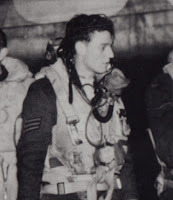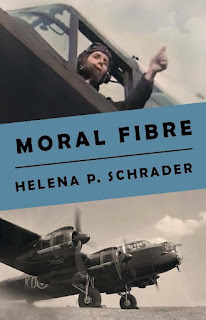Helena P. Schrader's Blog, page 13
April 25, 2023
The Characters of "Moral Fibre" - Lancaster Skipper Kit Moran
"Moral Fibre" continues the story of Kit Moran, the hero of "Lack of Moral Fibre."
No sooner had I finished the novella "Lack of Moral Fibre," than I realized that the story had only started. Thenovella explained in flashbacks why the hero,Kit Moran, had refused to take part in an operation against Berlin in November 1943. The more important book was about what happened after the RAF gave him a second chance.
And so Moral Fibre was born.
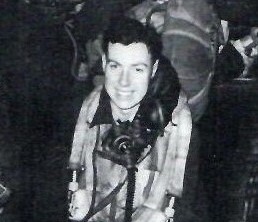
Excerpt 1:
Amanda leaned back in herchair and propped her feet on a footrest, asking Edwin to pour her a glass ofport before announcing, “I quite like him. Don’t you?”
Edwin smiled faintly as hebrought her her drink. “I like him very much, unfortunately.”
“Why ‘unfortunately’?” Amandaasked, startled.
“Because he’s going back tooperational flying in a few months.”
Amanda started. She hadn’tgiven a thought to that all evening. Despite knowing him for so short a time, shedid not like to think he might be killed as Don had been, before he reallylived. She protested lamely, “Well, we are winning the war. Germany may wellhave surrendered by the end of the year.”
“We can pray for that, but Idoubt Germany is going to collapse that quickly. The Germans may withdrawsteadily from occupied territory, but they will dig in and defend theirfatherland like the devil. If you want my opinion, as a former infantryofficer, this war is going to last at least another year. What that means, mydear, is that Flying Officer Moran is almost certain to face operations again.He told me flat out that he’d volunteered for aircrew because he wanted asecond chance.”
“That’s understandable.”
“Yes. But a second chance forwhat?”
“Presumably to prove he’s nota coward.”
“Surely a man with aDistinguished Flying Medal doesn’t need to prove that?”
“But he refused to fly—”
“I know. I know. But — well —never mind. Maybe I’m just imagining things.” Edwin waved at the air as if tochase away an unwanted thought.
“Edwin.” Amanda addressedhim ominously as she brought her feet off the footrest and planted them firmlyon the floor again. She fixed her gaze on her husband and insisted in a deadlyserious tone, “Finish what you were about to say.”
Her husband removed hisglasses and closed his eyes as he pinched the bridge of his nose. “It was justa thought,” he muttered.
“No, it wasn’t.” Amandacountered. They had been married more than twenty years, and she knew exactlywhat this was. “It was one of your intuitions, wasn’t it?”
“I don’t know. It was justthat when he said he wanted a second chance, I thought —”
“Yes?”
“I had this horrible feelingthat he believes he should have been killed instead of Don, and that he’sgiving himself a second chance to die.”
As noted last week, Kit Moran asked me to write his story -- perhaps in part because he knew that I shared his love of Africa —the hot, dry savannahs, the untamed mountains, the silhouette of the acacia treesagainst the vivid colors of an African sunset, the irresistible rhythm of the music,and the beat of the drum demanding that you dance. He knew, too, that I hadwitnessed the insidious corrosion caused by corruption, the destructive power ofethnic hatred, and the eternal injustice of racism spawned by white supremacists.Kit trusted me to understand that he, although white and upper class on thesurface, was not cut off from that quarter of him that was black.
Having convinced Kit that I wastrustworthy and could write to his satisfaction by writing Lack of Moral Fibre, he entrusted me with tellingthe story of his experiences as a Lancaster skipper — and the story of hislove.
For Kit, being entrusted with the command of a Lancaster and with it the responsibility for the lives six other men was the most momentous moment of his life. As noted last week, Kit's life in the RAF started as an aircraft mechanic ("fitter" in RAF terms), but he didn't feel comfortable watching other men risk their lives while he was safe. He volunteered for aircrew in early 1942 and because of his background as a fitter was mustered as a flight engineer. In this capacity, he flew a complete tour of operations in the crew of Flight Lieutenant Donald Selkirk
Kit and Don forged a close and deep friendship. Because of his mixed blood, Kit had never been fully accepted at school in South Africa. Because he didn't go to school in England, his years as an apprentice had been awkward and he hadn't felt completely comfortable. As fitter in the RAF he finally found comradeship, but only at the price of blending in with the crowd and not being fully himself. Suddenly, with Don he had found someone who didn't care about his mixed racial heritage, yet shared values, his fears and hopes. Don, despite being the only son of a landed Scottish family, the last in a long line of military heroes, is essentially a shy young man intimidated by the expectations placed in him. Don and Kit become best friends, and with Kit's parents in Africa Don's parents "adopt" Kit and treat him as a second son.
It is while they are flying together that the two friends encounter two girls at a dance. For Don and Georgina it is love at first sight. They have eyes for no one else and are soon engaged. But Georgina is a vicar's daughter, and Don is shy and diffident. They respect conventions and that means that they meet mostly in public venues and dating is usually as a foursome with Kit and Georgina's best friend Fiona forming the other couple.
Kit is intrigued by the darkly handsome Fiona, but she is an "emancipated" woman who disdains traditional female roles. She wants her own career. She isn't interested in getting engaged. She rebuffs Kit before he even asks her to marry him, and when he gets posted LMF, she breaks off the relationship altogether "so he won't have false hopes." She thinks she's being "fair" and "kind." In a way she is. They weren't really suited to one another.
So when Kit volunteers to return to operations, he does so without emotional attachment to a woman. What he hadn't reckoned with was that Don's grieving fiance Georgina would turn to him for comfort, or that he would find himself falling in love with her. He doesn't really want emotional involvement at a time when he will soon be facing the flak and the fighters again, this time with responsibility for six other men, his crew.
Excerpt 2:
Kit had been through thecrewing up process before, when he’d been recruited for Don Selkirk’s crew.Then, as now, he’d found the exercise absurdly informal and haphazard. Themembers of the course collected in a large, empty hall and were told,literally, to “sort themselves out.” They were expected to organise themselvesinto crews of five with one pilot, one navigator, one bomb aimer, one radiooperator and an air gunner. Two additional members of the crew, the mid-uppergunner and the flight engineer, would not join until they went to a HeavyConversion Unit (HCU) several months from now. The five men who teamed up here,however, formed the core and largely determined the character of each crew. Asa flight engineer, Kit had been accepted into Don’s crew at the HCU after it hadalready become a close-knit and well-functioning team. It felt as if he’d beenadopted by them. As a pilot, in contrast, he had the responsibility to create acrew nucleus from scratch by selecting airmen who were both competent in theirrespective jobs and would work together well. The best crews melded into awell-functioning team. Those that didn’t were often the first to go for aBurton.
Kit remembered the bomb aimeron Don’s crew complaining that they had less time to choose a crew than a wife.Yet, as he put it, “choose the wrong wife and you just find a skirt on the side;choose the wrong skipper and its curtains.” Don had retorted that the wrongnavigator, radio operator or air gunners would be just as deadly. “All seven ofus have a vital job to do, and all of our lives depend on each of us doing his well.”
Kit surveyed the chaos infront of him and wondered how he could possibly identify the right men fromthis horde of virtual strangers. Forrester, on the other hand, approached theprocess with a methodical and nearly scientific single-mindedness. For twoweeks, he had been bluntly asking men about their assessments and exam scores,marking down their answers in a small, notebook. As soon as the StationCommander told them to get started, Forrester made a beeline for the Canadians.Forrester had told Kit the troublemakers were “feisty” and “aggressive,”qualities he wanted in his crew, especially for the air gunners.
Kit didn’t agree, but thebigger problem was his reluctance to choose anyone at all. Kit didn’t planto die, but he couldn’t escape the feeling that his chances of survival werepoor. Statistically, more than half the men in this room would be dead beforethey completed their first tour. Kit’s unease, however, extended beyond thestatistics.
For one thing, Don had beenthe best skipper imaginable, yet he’d bought it. Clearly a pilot judged“average” had an even lower chance of making it. The odds meant Kit would needgood luck, and a profound sense of having already used up more than his fairshare unsettled him. He’d made it through thirty-six ops without a scratch. Onthe night Don was killed, the bomb aimer, navigator and radio operator had alsobeen injured, the navigator and radio operator critically. Yet while shrapnelhad torn slices through his flight jacket and burned holes in his boots, Kitremained completely unscathed. Kit didn’t think he deserved to escapeinjury and death more than the others. If anyone had not deserved todie, it was Don. His mother might credit his survival to a ‘guardian angel,’but Kit thought rather he had been dicing with the devil — and the devil didn’tlike to lose, not in the long run.
Of course, there was noreason to assume he would take his whole crew with him when he got the chop,but the RAF had done away with second pilots long ago. That meant that if hebought it his crew stood little chance of returning safely. The best they couldhope for was to bail-out.
Standing in that echoing hallfilled with eager young men chatting, laughing, gesturing and shaking hands,Kit felt like bad luck. Tapping someone on the shoulder would be like the grimreaper pointing a finger at them. On the other hand, if he approached no-one hewould be left with the dregs, the men no one else wanted. The result would be acrew of misfits, further diminishing his — and their — chances of survival.
MORAL FIBRE IS THE WINNER OF THE HEMINGWAY AWARD FOR 20TH CENTURY WARTIME FICTION
IT WAS ALSO A FINALIST FOR THE BOOK EXCELLENCE AWARD 2023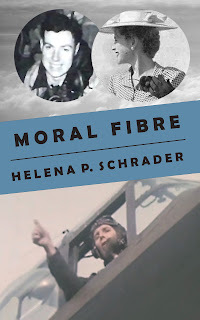 Riding the icy, moonlit sky,
Riding the icy, moonlit sky, they took the war to Hitler.
Their chances of survival were less than fifty percent.
Their average age was 21.
This is the story of just one bomber pilot, his crew and the woman he loved.
It is intended as a tribute to them all.
or Barnes and Noble.
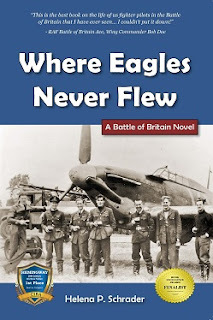 "This is the best book on the life of us fighter pilots in the Battle of Britain that I have ever seen.... I couldn't put it down."-- RAF Battle of Britain ace, Wing Commander Bob Doe.
"This is the best book on the life of us fighter pilots in the Battle of Britain that I have ever seen.... I couldn't put it down."-- RAF Battle of Britain ace, Wing Commander Bob Doe.
Winner of a Hemingway Award for 20th Century Wartime Fiction, a Maincrest Media Award for Military Fiction and Silver in the Global Book Awards.
Find out more at: https://crossseaspress.com/where-eagles-never-flew
For more information about all my books visit: https://www.helenapschrader.com
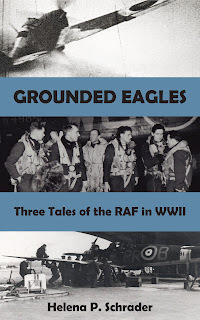 Disfiguring injuries, class prejudice and PTSD are the focus of three tales set in WWII by award-winning novelist Helena P. Schrader. Find out more at: https://crossseaspress.com/grounded-eagles
Disfiguring injuries, class prejudice and PTSD are the focus of three tales set in WWII by award-winning novelist Helena P. Schrader. Find out more at: https://crossseaspress.com/grounded-eagles
"Moral Fibre" - Lancaster Skipper Kit Moran
"Moral Fibre" continues the story of Kit Moran, the hero of "Lack of Moral Fibre."
No sooner had I finished the novella "Lack of Moral Fibre," than I realized that the story had only started. Thenovella explained in flashbacks why the hero,Kit Moran, had refused to take part in an operation against Berlin in November 1943. The more important book was about what happened after the RAF gave him a second chance.
And so Moral Fibre was born.

Excerpt 1:
Amanda leaned back in herchair and propped her feet on a footrest, asking Edwin to pour her a glass ofport before announcing, “I quite like him. Don’t you?”
Edwin smiled faintly as hebrought her her drink. “I like him very much, unfortunately.”
“Why ‘unfortunately’?” Amandaasked, startled.
“Because he’s going back tooperational flying in a few months.”
Amanda started. She hadn’tgiven a thought to that all evening. Despite knowing him for so short a time, shedid not like to think he might be killed as Don had been, before he reallylived. She protested lamely, “Well, we are winning the war. Germany may wellhave surrendered by the end of the year.”
“We can pray for that, but Idoubt Germany is going to collapse that quickly. The Germans may withdrawsteadily from occupied territory, but they will dig in and defend theirfatherland like the devil. If you want my opinion, as a former infantryofficer, this war is going to last at least another year. What that means, mydear, is that Flying Officer Moran is almost certain to face operations again.He told me flat out that he’d volunteered for aircrew because he wanted asecond chance.”
“That’s understandable.”
“Yes. But a second chance forwhat?”
“Presumably to prove he’s nota coward.”
“Surely a man with aDistinguished Flying Medal doesn’t need to prove that?”
“But he refused to fly—”
“I know. I know. But — well —never mind. Maybe I’m just imagining things.” Edwin waved at the air as if tochase away an unwanted thought.
“Edwin.” Amanda addressedhim ominously as she brought her feet off the footrest and planted them firmlyon the floor again. She fixed her gaze on her husband and insisted in a deadlyserious tone, “Finish what you were about to say.”
Her husband removed hisglasses and closed his eyes as he pinched the bridge of his nose. “It was justa thought,” he muttered.
“No, it wasn’t.” Amandacountered. They had been married more than twenty years, and she knew exactlywhat this was. “It was one of your intuitions, wasn’t it?”
“I don’t know. It was justthat when he said he wanted a second chance, I thought —”
“Yes?”
“I had this horrible feelingthat he believes he should have been killed instead of Don, and that he’sgiving himself a second chance to die.”
As noted last week, Kit Moran asked me to write his story -- perhaps in part because he knew that I shared his love of Africa —the hot, dry savannahs, the untamed mountains, the silhouette of the acacia treesagainst the vivid colors of an African sunset, the irresistible rhythm of the music,and the beat of the drum demanding that you dance. He knew, too, that I hadwitnessed the insidious corrosion caused by corruption, the destructive power ofethnic hatred, and the eternal injustice of racism spawned by white supremacists.Kit trusted me to understand that he, although white and upper class on thesurface, was not cut off from that quarter of him that was black.
Having convinced Kit that I wastrustworthy and could write to his satisfaction by writing Lack of Moral Fibre, he entrusted me with tellingthe story of his experiences as a Lancaster skipper — and the story of hislove.
For Kit, being entrusted with the command of a Lancaster and with it the responsibility for the lives six other men was the most momentous moment of his life. As noted last week, Kit's life in the RAF started as an aircraft mechanic ("fitter" in RAF terms), but he didn't feel comfortable watching other men risk their lives while he was safe. He volunteered for aircrew in early 1942 and because of his background as a fitter was mustered as a flight engineer. In this capacity, he flew a complete tour of operations in the crew of Flight Lieutenant Donald Selkirk
Kit and Don forged a close and deep friendship. Because of his mixed blood, Kit had never been fully accepted at school in South Africa. Because he didn't go to school in England, his years as an apprentice had been awkward and he hadn't felt completely comfortable. As fitter in the RAF he finally found comradeship, but only at the price of blending in with the crowd and not being fully himself. Suddenly, with Don he had found someone who didn't care about his mixed racial heritage, yet shared values, his fears and hopes. Don, despite being the only son of a landed Scottish family, the last in a long line of military heroes, is essentially a shy young man intimidated by the expectations placed in him. Don and Kit become best friends, and with Kit's parents in Africa Don's parents "adopt" Kit and treat him as a second son.
It is while they are flying together that the two friends encounter two girls at a dance. For Don and Georgina it is love at first sight. They have eyes for no one else and are soon engaged. But Georgina is a vicar's daughter, and Don is shy and diffident. They respect conventions and that means that they meet mostly in public venues and dating is usually as a foursome with Kit and Georgina's best friend Fiona forming the other couple.
Kit is intrigued by the darkly handsome Fiona, but she is an "emancipated" woman who disdains traditional female roles. She wants her own career. She isn't interested in getting engaged. She rebuffs Kit before he even asks her to marry him, and when he gets posted LMF, she breaks off the relationship altogether "so he won't have false hopes." She thinks she's being "fair" and "kind." In a way she is. They weren't really suited to one another.
So when Kit volunteers to return to operations, he does so without emotional attachment to a woman. What he hadn't reckoned with was that Don's grieving fiance Georgina would turn to him for comfort, or that he would find himself falling in love with her. He doesn't really want emotional involvement at a time when he will soon be facing the flak and the fighters again, this time with responsibility for six other men, his crew.
Excerpt 2:
Kit had been through thecrewing up process before, when he’d been recruited for Don Selkirk’s crew.Then, as now, he’d found the exercise absurdly informal and haphazard. Themembers of the course collected in a large, empty hall and were told,literally, to “sort themselves out.” They were expected to organise themselvesinto crews of five with one pilot, one navigator, one bomb aimer, one radiooperator and an air gunner. Two additional members of the crew, the mid-uppergunner and the flight engineer, would not join until they went to a HeavyConversion Unit (HCU) several months from now. The five men who teamed up here,however, formed the core and largely determined the character of each crew. Asa flight engineer, Kit had been accepted into Don’s crew at the HCU after it hadalready become a close-knit and well-functioning team. It felt as if he’d beenadopted by them. As a pilot, in contrast, he had the responsibility to create acrew nucleus from scratch by selecting airmen who were both competent in theirrespective jobs and would work together well. The best crews melded into awell-functioning team. Those that didn’t were often the first to go for aBurton.
Kit remembered the bomb aimeron Don’s crew complaining that they had less time to choose a crew than a wife.Yet, as he put it, “choose the wrong wife and you just find a skirt on the side;choose the wrong skipper and its curtains.” Don had retorted that the wrongnavigator, radio operator or air gunners would be just as deadly. “All seven ofus have a vital job to do, and all of our lives depend on each of us doing his well.”
Kit surveyed the chaos infront of him and wondered how he could possibly identify the right men fromthis horde of virtual strangers. Forrester, on the other hand, approached theprocess with a methodical and nearly scientific single-mindedness. For twoweeks, he had been bluntly asking men about their assessments and exam scores,marking down their answers in a small, notebook. As soon as the StationCommander told them to get started, Forrester made a beeline for the Canadians.Forrester had told Kit the troublemakers were “feisty” and “aggressive,”qualities he wanted in his crew, especially for the air gunners.
Kit didn’t agree, but thebigger problem was his reluctance to choose anyone at all. Kit didn’t planto die, but he couldn’t escape the feeling that his chances of survival werepoor. Statistically, more than half the men in this room would be dead beforethey completed their first tour. Kit’s unease, however, extended beyond thestatistics.
For one thing, Don had beenthe best skipper imaginable, yet he’d bought it. Clearly a pilot judged“average” had an even lower chance of making it. The odds meant Kit would needgood luck, and a profound sense of having already used up more than his fairshare unsettled him. He’d made it through thirty-six ops without a scratch. Onthe night Don was killed, the bomb aimer, navigator and radio operator had alsobeen injured, the navigator and radio operator critically. Yet while shrapnelhad torn slices through his flight jacket and burned holes in his boots, Kitremained completely unscathed. Kit didn’t think he deserved to escapeinjury and death more than the others. If anyone had not deserved todie, it was Don. His mother might credit his survival to a ‘guardian angel,’but Kit thought rather he had been dicing with the devil — and the devil didn’tlike to lose, not in the long run.
Of course, there was noreason to assume he would take his whole crew with him when he got the chop,but the RAF had done away with second pilots long ago. That meant that if hebought it his crew stood little chance of returning safely. The best they couldhope for was to bail-out.
Standing in that echoing hallfilled with eager young men chatting, laughing, gesturing and shaking hands,Kit felt like bad luck. Tapping someone on the shoulder would be like the grimreaper pointing a finger at them. On the other hand, if he approached no-one hewould be left with the dregs, the men no one else wanted. The result would be acrew of misfits, further diminishing his — and their — chances of survival.
 Riding the icy, moonlit sky,
Riding the icy, moonlit sky, they took the war to Hitler.
Their chances of survival were less than fifty percent.
Their average age was 21.
This is the story of just one bomber pilot, his crew and the woman he loved.
It is intended as a tribute to them all.
or Barnes and Noble.
 "This is the best book on the life of us fighter pilots in the Battle of Britain that I have ever seen.... I couldn't put it down."-- RAF Battle of Britain ace, Wing Commander Bob Doe.
"This is the best book on the life of us fighter pilots in the Battle of Britain that I have ever seen.... I couldn't put it down."-- RAF Battle of Britain ace, Wing Commander Bob Doe.
Winner of a Hemingway Award for 20th Century Wartime Fiction, a Maincrest Media Award for Military Fiction and Silver in the Global Book Awards.
Find out more at: https://crossseaspress.com/where-eagles-never-flew
For more information about all my books visit: https://www.helenapschrader.com
 Disfiguring injuries, class prejudice and PTSD are the focus of three tales set in WWII by award-winning novelist Helena P. Schrader. Find out more at: https://crossseaspress.com/grounded-eagles
Disfiguring injuries, class prejudice and PTSD are the focus of three tales set in WWII by award-winning novelist Helena P. Schrader. Find out more at: https://crossseaspress.com/grounded-eagles
April 18, 2023
"Lack of Moral Fibre" - Flight Engineer Kit Moran
"Lack of Moral Fibre" is the third novella of the "Grounded Eagles" Trilogy. It examines the case of a flight engineer posted away from his squadron for alleged "Lack of Moral Fibre" (LMF). The term was introduced into RAF vocabulary in 1940 to characterize aircrew who refused to fly and/or had "lost the confidence of the commanding officer." Men designated "LMF" faced swift disciplinary action.
Excerpt I:
“Pilot Officer ChristopherMoran?”
The orderly clerk stilladdressed him with his rank, Kit noted, wondering for how long. “Yes,” heanswered.
“You’re in room 24.” Theclerk turned to remove a key from the wooden pigeonholes behind him. He handedit to Moran across the reception desk without looking him in the eye.
People had been avoidingeye-contact ever since he’d been posted away from the squadron. The station commandertold him to depart as rapidly and discreetly as possible, while his squadron leaderreinforced that message with instructions not to say good-bye to any of his formercomrades. His orders were to report “immediately” to this mysteriouslydesignated NYDN centre.
It was, however, disorientingto be in what had evidently been a hotel. Although now outfitted with RAF standard-issuefurnishings, remnants of its former grandeur lingered in the ceiling mouldingsand gracious, bay windows. If it hadn’t been sleeting, there might even havebeen a view down to Torbay. Instead, visibility was so bad that everythingbeyond the windows was just a blurry white and grey. That backdrop highlightedthe gloomy interior. The lobby furnishings were run-down, and four years of warmarked the inhabitants, too. Unremittingly dressed in Air Force blue, theiraverted faces were strained and prematurely lined.
Kit took the key, shoulderedhis kitbag, and found his way up two flights of stairs to room 24. While the lobbyhad been overheated, the hall was bitterly cold. He unlocked the door and foundhimself in a modest room with two twin beds. He was taken aback to find one ofthe beds already occupied by a man wrapped in blankets.
“Sorry! I must have the wrongroom!” Kit started to back out.
“No,” a voice rose from thebed. “They double us up like this.”
“Oh, of course,” Kit noddedto himself. Why hadn’t he expected that? He’d expected far worse. He enteredand closed the door behind him before introducing himself. “I’m ChristopherMoran, but I go by Kit.”
“Oliver Huckle, and if youdon’t mind, I don’t want to talk.” His roommate rolled over, offering his back.
“Fine by me,” Kit muttered. Hedidn’t particularly want to talk himself. He tossed his kitbag on the vacantbed and started unpacking his things. He’d done this countless times on countlessRAF Stations for almost four years now. This was just one more move, one moreposting. Except it wasn’t.
Kit went to the window. Sleetpelted the glass, making a high ticking sound before melting and slitheringdown the slick surface. His breath rapidly steamed up the inside. Kit raised anindex finger to write in the condensation: LMF — for Lack of Moral Fibre.
Everyone knew what happenedto aircrew who “earned” that label. They were publicly stripped of their flyingbadges, their rank insignia, and any ribbons they may have been awarded. Officerswere officially court-martialled and lost their commissions. They were shippedoff to do menial work, transferred to the infantry, or discharged to work inthe coal mines. Their records were stamped in large letters: “LMF” or “W” for“Waverer.” Their discharge papers stated the same thing, ensuring problems withcivilian employment for the rest of their lives.
Everyone knew of someone whohad disappeared down this road to infamy, and no one ever saw them again. What Kithadn’t known about were the NYDN centres, the gateway to LMF hell.
Although every work of fiction I write has been inspired in one way or another, few of my books or stories were quite as dramatically inspired as this novella and the full-length novel that followed it. I can literally remember the exact moment when, feeling quite smug about the two-novella anthology I was intending to release later in the year, I suddenly realized that a story was lacking. Abruptly, without warning of any kind, I knew I had to write a third story about a young man posted for "LMF."
At the time, I knew almost nothing about the term LMF or the procedures surrounding it. All I knew was that someone was insisting that I tell his story and to do that I needed to do some research. I put all my other projects on hold and started to investigate not just LMF but the entire RAF strategic bombing campaign, the recruitment, training, operations, and the aircrew of Bomber Command. I had to learn about Lancasters, their seven-man crew, the tactics employed by the RAF etc. I bought and read a score of first-hand accounts and more general histories until I gradually developed some expertise on the topic -- and the RAF's handling of aircrew that refused to fly without a medical reason. Most informative were post-war analyses published by journals of medical history which provided hard data including statistics.
Yet at the core of the novel was Kit Moran's story, the story he shared with me from beyond the grave. I found it fascinating and compelling, and ultimately irresistible.
Kit was born in South Africa, the son of a colonial official and a missionary's daughter by his African wife. His father served in Kenya and Nigeria, and Kit went to school in pre-apartheid South Africa where he faced no outright discrimination but subtle and constant alienation. He left school at 16 to take an apprenticeship with an engineering firm in the UK, and enlisted in the RAF at the outbreak of the war when just 19. He initially trained and mustered as ground crew and only later volunteered for aircrew, eventually flying and surviving a full tour of operations as a flight engineer.
The novella opens with the excerpt above and then scene by scene reveals Kit's character and the factors that led Kit to refuse to fly in late November 1943.
Excerpt 2:
His father stood and walkedtoward the darkness and then abruptly flung out his arms and made a loudhissing sound. Something large, silent, light footed and very fast sprang awayin the darkness. His father returned to the fire with a smile. “Just a cheetah.”
Kit tried to relax. To hisfather he admitted, “I didn’t get much practice with my rifle while at school. I’mnot a very good marksman.”
“A safari isn’t all aboutkilling,” Kit’s father replied unperturbed.
“What is it about then?”
“For me, it is mostly aboutobserving and enjoying the vast natural world around us.”
“The porters say you killed acharging lion,” Kit countered in awe.
His father laughed. “It wasan old, sick lion — that was why he was preying on people. Humans don’t tastevery nice and fit lions prefer other meals. This lion was blind in one eye, Ithink, and certainly limped from an old injury. I shot him because hethreatened the villagers — a young boy had been dragged away while herding thegoats.”
“Why didn’t you bring theskin home?”
“It was in terrible shape —matted and scarred. He was a very old lion, Kit, but he must have been fierceonce.”
“The porters say you werevery brave.”
“Not really. I had a powerfulrifle. If I had faced him with a spear, that would have been brave.”
“But lions have been known tokill Europeans.”
“Usually when they werebehaving foolishly. If you learn nothing else this trip, remember that doingsomething just to show you’re brave is usually foolish.”
“But courage is the essenceof manhood,” Kit protested. “In every African tribe, youths have to pass a testof courage before they are recognized as men.”
“Yes,” his father agreedcautiously. “That’s because in those cultures an adult male is automatically awarrior and so physical courage is the essential prerequisite to fulfill hisrole in society. In our society, on the other hand, not all men are warriors,and there are many other kinds of courage than the raw physical kind needed tohunt big game.”
“What do you mean?”
“Well, for example, standingup for someone who is being unfairly criticized or ridiculed can be just ascourageous as shooting some wild animal that is only trying to survive.”
Kit caught his breath. “Youmean standing up for Mum?”
“Yes, among other things.”
Kit looked down rememberingall the times at school when he had just let the others insult the natives. Onlythe Zulus earned a modicum of respect because they were such fierce warriors. Theothers were dismissed as lazy and stupid. Kit had said nothing, despite knowingthat his mother and grandmother were neither.
“It’s hard,” his father admitted.“It’s hard to fight injustice and prejudice and racism — much harder than shootinga wild animal.” After a long pause he admitted, “I ran away more often than Istood up to people. It was easier to come here to the bush, to live amongpeople that did not look down on us. However, if you want to have the freedomto live wherever you want and follow whatever profession you choose, you aregoing to have to learn how to be braver than I was.”
 Disfiguring injuries, class prejudice and PTSD are the focus of three tales set in WWII by award-winning novelist Helena P. Schrader. Find out more at: https://crossseaspress.com/grounded-eagles
Disfiguring injuries, class prejudice and PTSD are the focus of three tales set in WWII by award-winning novelist Helena P. Schrader. Find out more at: https://crossseaspress.com/grounded-eagles
they took the war to Hitler.
Their chances of survival were less than fifty percent.
Their average age was 21.
This is the story of just one bomber pilot, his crew and the woman he loved.
It is intended as a tribute to them all.
or Barnes and Noble.
 "This is the best book on the life of us fighter pilots in the Battle of Britain that I have ever seen.... I couldn't put it down."-- RAF Battle of Britain ace, Wing Commander Bob Doe.
"This is the best book on the life of us fighter pilots in the Battle of Britain that I have ever seen.... I couldn't put it down."-- RAF Battle of Britain ace, Wing Commander Bob Doe.
Winner of a Hemingway Award for 20th Century Wartime Fiction, a Maincrest Media Award for Military Fiction and Silver in the Global Book Awards.
Find out more at: https://crossseaspress.com/where-eagles-never-flew
For more information about all my books visit: https://www.helenapschrader.com
April 10, 2023
"A Rose in November" - Rhys Jenkins
"A Rose in November" is the second novella of the "Grounded Eagles" Trilogy. It is a love story for the not-so-young in that it describes the romantic attraction between two middle-aged people from very different backgrounds. Hattie Fitzsimmons was introduced last week. Rhys Jenkins is the man she falls in love with at 45.
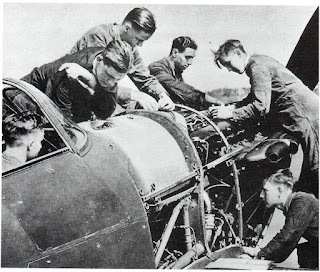
Excerpt 1:
Rhys Jenkins was torn from a deep sleep and grunted audibly when thealarm woke him. It was still pitch dark beyond the black-out blinds. He swunghis legs over the edge of the bed and switched on the light so he could washand dress quickly and quietly without disturbing the kids. He had been dreamingvividly, and he tried to bring the dream back to his consciousness, as he letwater into the basin from the two taps. Plunging his hands in to the lukewarmwater, he flung water over his face and wiped it dry with the towel hangingbeside the sink. The dream eluded him, but it had taken him back in time — somuch so that as he went to shave, he found himself asking when his hair hadgone so grey? Could he really be an ageing man when he felt like he hadn’t yetstarted to live?
Wasn’t he still the same young man who had scrambled up from a trench inlate 1916 to give a downed pilot a hand restarting his engine? That too hadbeen on a cold and dark November day. The mud of no man’s land had been frosted in the first glimmer of dawn.They had heard the aircraft sputtering overhead and looked up in astonishmentas it banked and set itself down on the rough stretch of mud. They were evenmore astonished still when the pilot clambered out and ran around to open thecowling of his engine. “Must have some kind of engine trouble”, someonesurmised as they all stood there staring.
Rhys had glanced towards the rising sun and reckoned the Germanartillery spotters would soon find the downed plane and start taking potshotsat it. He handed his tin mug filled with lukewarm tea to one of his mates andscrambled out of the trench to jog over to the pilot. “Can I help, sir?”
The young man who looked over at him in evident astonishment was abouthis age. He had pushed his goggles onto his forehead, but they left huge, redrings around his eyes, making him look frightened and vulnerable. He wasbundled up against the cold, but his hands were so numb and stiff they werepractically useless. “Do you know anything about aircraft engines?” he asked inan accent Rhys had only heard from very senior officers — the ones who came andwent and never said much anyway.
“No, sir, but I’ve tinkered with the odd car engine. If you tell me whatto do….”
Somehow together they got the thing going again. He and the pilot turnedthe fragile crate around by the wing tips so it faced the longest stretch ofmore-or-less level ground they could find, and then the pilot started to climbback into the cockpit. He stopped and looked back over his shoulder, “I say,what is your name?”
“Lance Corporal Jenkins, sir. Royal Welsh Fusiliers.”
“Ever think of joining the RFC?” That was the Royal Flying Corps.
“No, sir. Do you think they’d take someone like me?”
“They would if they had any brains, but you never can be sure with theblimps, can you? Thanks again and cheerio!” The pilot and aircraft disappearedin the misty November morning, never to be seen or heard again. The idea ofjoining the RFC, on the other hand, wouldn't leave me alone.
Rhys is the son of a Welsh miner and never expected to do anything more than "go down the pit" until the First World War broke out. With the wisdom of hindsight, we know that WWI was a nightmare, but for youths like Rhys Jenkins it was a huge opportunity -- an opportunity to leave the parish where he'd be born. It was an opportunity to travel not just to London, but to Paris, too. It was an opportunity to meet men from other parts of the country, with different backgrounds, different religious views, and different goals. It was also an opportunity to learn a trade other than mining.
It doesn't take long for Rhys to realize he doesn't want to return to Wales and spent the rest of his life in the mines. He opts for the RFC and trains as an aircraft mechanic, a fitter. But before he left home he'd "walked out" with a girl and they had an "understanding." He feels he's made a commitment and when the war is over they marry. Gladys is an upright, honest, and hard-working woman, who abhors sex and only endures it for the sake of children. She is also a strict disciplinarian, who finds it hard to show emotion. She doesn't make Rhys happy, but his own strict upbringing makes it impossible for him to break with her or even cheat on her. She's a "good" woman and he has no cause for complaint. He seeks his happiness at work rather than at home.
Then, in 1937 she dies leaving him with two children, the 14-year-old Ellen and the 11-year old Owain. He tries to be a father to them, but he has a demanding job -- that in the spring of 1940 becomes a 24/7 kind of job. Rhys is on the front-line of the Battle of Britain, keeping the aircraft of "the Few" armed, serviced and repaired.
When "A Rose in November" opens, the Battle of Britain is over but the Blitz continues. Rhys is now an experienced crew chief and his career is just about to take off when he gets posted to a front-line fighter squadron being re-equipped with Spitfires. Meanwhile, however, his Owain, now 14, increasingly skips school and is rude and insolent, while 17-year-old Ellen has dropped out of school to run his household. Solemnly she tries to replace her mother at the price of her own future. That's not what Rhys wants, he just doesn't have much time or aptitude for dealing with his teenagers.
The move to his new station, entails a short separation from the kids until he can find suitable housing off the station. Help is offered by a woman from the Salvation Army, Hattie Fitzsimmons. Before he knows what is happening, he finds himself attracted to her. Not only that: she returns his affection and soon a romance is blooming. But their class differences, the kids, and his job all threaten the relationship.
Excerpt 2:
The formation was changingoverhead, and Rhys enjoyed the sight of one after another Spitfires flickrolling. He was annoyed when a WAAF tugged at his sleeve. “Flight Sergeant,there is an urgent phone call for you — from the police.”
“The police?” Rhys couldn’tmake sense of that. What could the police want with him? An accident! Hattie!The way she drove, she’d probably had a car crash. He started running acrossthe field towards the mess. By the time he got to reception, he was almostcompletely out of breath. “There’s a—"
The WAAF at reception pointedhim towards the phone booth.
“Jenkins!” He gasped into thereceiver.
“One moment.”
He sobbed for breath, hispulse racing.
“Flight Sergeant Jenkins?”
“Yes.”
“This is Chief ConstableKilian of the Salisbury Metropolitan Police. I regret to inform you that yourson, Owain Jenkins, was arrested this afternoon for shoplifting. Your daughter,Miss Ellen Jenkins, asked us to inform you. Bail has been set at £5.”
“Shoplifting?” Rhys asked,dazed, still trying to get his bearings. Hattie was all right, but Owain hadbeen arrested? In Salisbury? “What did he steal? Is it certain?”
“Very. He was observed by acustomer and a sales assistant and when arrested he was still in possession ofthe stolen goods, namely four batteries, two packets of cigarettes and acamera. Furthermore, he resisted arrest, using foul language and attempting toinflict physical harm on the arresting officers. He broke Constable Walker’sglasses in the process.”
“He’s only thirteen,” Rhysstammered.
“Yes, and his sister is onlyseventeen.” The chief constable left him in no doubt as to what he thought ofRhys leaving his under-aged children to fend for themselves. “We stronglysuggest that you take custody of your own children, Mr Jenkins, at the earliestopportunity.”
“Yes, of course. I’ll comeright away. I’ll be there….” He looked helplessly at his watch, feeling vaguelysick. He would have to take leave, hitch a ride to Chichester, get the nexttrain, and where was he supposed to come up with the bail? He’d just paid theestate agent the required three months advance on the cottage, not to mentionthat he’d been living a bit beyond his means to take Hattie out as often as hedid. He wouldn’t draw his pay for another week. “I’ll be there tomorrowmorning. I don’t know when exactly with trains and all, but I’ll be therebefore noon.”
“We look forward to meetingyou, Mr Jenkins,” the constable told him primly and hung up.
 Disfiguring injuries, class prejudice and PTSD are the focus of three tales set in WWII by award-winning novelist Helena P. Schrader. Find out more at: https://crossseaspress.com/grounded-eagles
Disfiguring injuries, class prejudice and PTSD are the focus of three tales set in WWII by award-winning novelist Helena P. Schrader. Find out more at: https://crossseaspress.com/grounded-eagles
they took the war to Hitler.
Their chances of survival were less than fifty percent.
Their average age was 21.
This is the story of just one bomber pilot, his crew and the woman he loved.
It is intended as a tribute to them all.
or Barnes and Noble.
 "This is the best book on the life of us fighter pilots in the Battle of Britain that I have ever seen.... I couldn't put it down."-- RAF Battle of Britain ace, Wing Commander Bob Doe.
"This is the best book on the life of us fighter pilots in the Battle of Britain that I have ever seen.... I couldn't put it down."-- RAF Battle of Britain ace, Wing Commander Bob Doe.
Winner of a Hemingway Award for 20th Century Wartime Fiction, a Maincrest Media Award for Military Fiction and Silver in the Global Book Awards.
Find out more at: https://crossseaspress.com/where-eagles-never-flew
For more information about all my books visit: https://www.helenapschrader.com
April 4, 2023
"A Rose in November" - Hattie Fitzsimmons
"A Rose in November" is the second novella of the "Grounded Eagles" Trilogy. The term "lost generation" is traditionally used to characterize men who survived WWI at the price of losing their ideals and moral compass. Yet the other half of the "lost generation" were the women left behind by a war that had devoured the young men they would normally have married. Hattie Fitzsimmons is such a woman. Rather than despair or bemoan her fate, she sets out to make her life meaningful in the Salvation Army. The one thing she doesn't expect is to find love at 45.
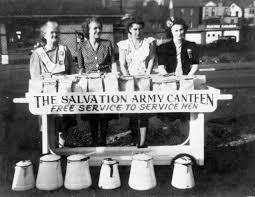
Excerpt 1:
"I hope you don't mind me dropping in unexpectedly," Hattie started as she pulled off her hat and gloves.
"You know I don't! We've seen far to little of one another since I married." Emily had worked at the Seaman's mission, and she had met Robin when he came to see his aunt Hattie. Hattie liked to take credit for them meeting, but she would never have intentionally brought them together. Robin had been the kind of young man to go out with very glamorous girls, and Emily was not glamorous. "Shall I put the kettle on?" she asked. ... Emily produced biscuits from one of the cupboards and put them in front of Hattie. "Was there any particular reason why you called?"
Hattie's heart started to flutter and she felt silly. She thought of denying it, but she so desperately wanted to talk to someone about it. She just didn't dare meet Emily's eyes, so she busied herself arranging the biscuits on the plate Emily gave her. "What would you think if I said I'd been asked out to the flicks?"
"That's wonderful!" Emily exclaimed at once.
Hattie looked up at her sharply. "Don't you think its a bit ridiculous at my age?"
"Why? I mean, if you like him, if you want to go. Who is it?"
Hattie ignored the last question and concentrated on the rest. "Yes, I do like him. Very much. He must be about my age since he has a seventeen-year-old daughter. He's a widower of three years. He's candid and open-hearted. Yes I want to go to the cinema with him. But it seems very strange." She looked up at Emily uncertainly.
Emily -- bless her -- turned the kettle off as it started to whimper and sat down opposite. She looked at Hattie very seriously and stated with conviction: "I think you are one of the warmest people in the world and its a terrible pity that you haven't had anyone to share that with -- except Robin, of course. Its because you have so much warmth to give that you've been active in the Salvation Army. But you spend your time organizing and administering and paying bills -- well, taking care of all the business aspects. That's no substitute for personal affection. Finally, there is nothing ridiculous about two people caring about each other and wanting to be together at any age. I hope to God that Robin and I still feel affection for one another in our forties, fifties and sixties.
Hattie got up and gave her a heartfelt hug. "Thank you!"
Neither a great beauty nor an heiress, Hattie never had the best cards in the marriage market and by the end of WWI, she knew she is on her own, which was why she became active in the Salvation Army. Yet Hattie has another strike against her. AlthoughHattie is the daughter of a wealthy factory owner, she is the child of his second and scandalous marriage to a French dancing girl. In fact, she was born born out of wedlock and can still remember being called "the bastard" when she was small. Her father later married her mother, but her mother developed an alcohol problem and then abandoned her young family and disappeared. By WWI, Hattie, her sister Lydia and her father are living in "straightened circumstances" (for their class) but hardly in poverty. Hattie has been raised to be a "lady" and her expected future is a respectable marriage to a man of her class.
Her litter sister Lydia, however, is the pretty one. She is vivacious and flirtatious and captures the heart of a young navy officer. They marry in a whirlwind despite his parent's disapproval of Lydia, and then he's off to sea -- and death. Lydia is left behind a pregnant widow. Her son Robert -- Robin as he is known in the family -- is born after his father's death. Lydia has a small pension and the house in Southsea that he settled on her.
Hattie falls in love with an American officer, but he too is consumed by the war. So the sisters live together and jointly raise Robin -- until Hattie can't stand Lydia's silliness and complaints and criticism any longer an finds herself a small flat in Eastney. Meanwhile, the Salvation Army has become her life, and it is the "line of duty" -- serving out a hot meal from a mobile canteen at an airfield -- that she encounters Rhys Jenkins, an RAF Flight Sergeant. The attraction is immediate and mutual, but quite aside from Hattie's age, they are separated by class as well. Despite her dubious origins, her accent and her name put her in a different class from that of the coal-miner's son Rhys Jenkins. Hattie knows from their first encounter that her sister Lydia would be shocked and disapproving of any friendship with the Flight Sergeant.
But Lydia disapproves of nearly everything she does anyway, and Hattie no longer cares intensely about what Lydia thinks. The people that she needs to win over are Rhys' two teenage children -- and her own nephew and his new bride. The problems prove to be more than Hattie anticipated.
Excerpt 2:
"Don't you think you should tell us about the woman who left lipstick all over the towels upstairs?"
Rhys hand froze with the egg half-way to his mouth. Then he replaced his fork and sat back in his chair. Ellen was glaring at him furiously while Owain looked from his sister to his father in astonishment.
"Yes, Ellen, I do think I should tell you about her," Rhys managed to answer steadily. "In fact, I want you to meet her, but I thought we should have a little time just the three of us first."
"Just how long has this been going on?" Ellen demanded.
"I don't like that tone, Miss!" Rhys told her defensively. "I don't have to account to you!"
"No?" Ellen raised her eyebrows. She had never look so much like her mother, and Rhys lost his temper.
"No! Your mother has been dead for three years and she wouldn't let me into her bed for a hell of a lot longer than that! It's perfectly natural if I've found someone new. Most men would have found someone years ago -- whether they were married to your frigid mother or not!"
As soon as it was out, Rhys regretted it, but it was too late. Ellen gaped at him, and Owain giggled in embarrassment. Then Ellen jumped to her feet and ran out of the kitchen. He heard her run up the stairs and slam the door to her room. "Bloody hell," he muttered with a glance at Owain.
Owain shrugged his shoulders a little helplessly, but he seemed to be enjoying his father's discomfort too, as if it made his own arrest for shop-lifting a less serious offense.
With an oath, Rhys threw his napkin down beside his plate and went after Ellen. Standing outside the closed door of her room, he found himself trying to explain. "El, I'm sorry. I didn't mean to insult your Mum. I know she was a good woman. I never cheated on her. Not once in all our marriage. But you've got to understand, I'm - I'm not an old man yet. You and Owain aren't going to be around forever--"
"Now I know why you want me to go to some trade school! Why you want me to find a husband of my own! You want me out of the house so you can -- can have your affairs!
"That's not true! You know as well as I do that I've been begging you to go back to school for years. This has nothing to do with Hattie. And Hattie isn't an affair. I'm going to marry her."
Ellen answered with a wail of agony. Rhys looked about the narrow hall helplessly. This wasn't at all the way he'd imagined their fist day together in the beautiful cottage. He'd thought Ellen would be so pleased. She had been -- until she'd seen the wine glasses.
It was unfair. They hadn't even drunk any wine! And what if they had? Why shouldn't he have a little happiness? What right did Ellen have to make him feel guilty about the best thing that had happened to him in years? Why did she begrudge him his happiness? "Ellen! Stop that this minute!"
She wept more loudly.
Rhys looked around again. Owain was slouching at the foot of the stairs watching him. He grabbed the handle of Ellen's door and was astonished to find it was not locked. He went into the pretty bedroom with the flowery curtains framing the view of the bay. He had given Ellen the room because it was the prettiest in the cottage.
Ellen lay on her stomach, sobbing into her hands. Rhys took a deep breath and sat down on the edge of the bed. The soft mattress sagged under his weight. He stroked Ellen's shaking shoulders. "What are you so upset about, El? Don't you want your father to be happy? Don't I have the right to a little happiness after these last years?" He didn't manage to keep the resentment out of his voice.
"Why does your happiness depend on getting rid of me? What's so wrong with me? Why doesn't anyone want me around? Not even my own father! Everybody just wants to get rid of me. I wish I had never been born!"
 Disfiguring injuries, class prejudice and PTSD are the focus of three tales set in WWII by award-winning novelist Helena P. Schrader. Find out more at: https://crossseaspress.com/grounded-eagles
Disfiguring injuries, class prejudice and PTSD are the focus of three tales set in WWII by award-winning novelist Helena P. Schrader. Find out more at: https://crossseaspress.com/grounded-eagles
they took the war to Hitler.
Their chances of survival were less than fifty percent.
Their average age was 21.
This is the story of just one bomber pilot, his crew and the woman he loved.
It is intended as a tribute to them all.
or Barnes and Noble.
 "This is the best book on the life of us fighter pilots in the Battle of Britain that I have ever seen.... I couldn't put it down."-- RAF Battle of Britain ace, Wing Commander Bob Doe.
"This is the best book on the life of us fighter pilots in the Battle of Britain that I have ever seen.... I couldn't put it down."-- RAF Battle of Britain ace, Wing Commander Bob Doe.
Winner of a Hemingway Award for 20th Century Wartime Fiction, a Maincrest Media Award for Military Fiction and Silver in the Global Book Awards.
Find out more at: https://crossseaspress.com/where-eagles-never-flew
For more information about all my books visit: https://www.helenapschrader.com
March 28, 2023
"A Stranger in the Mirror" -- Pilot Officer David "Banks" Goldman
"A Stranger in the Mirror" that looks at the fate of one of the secondary characters in "Where Eagles Never Flew." After being shot down in September 1940, Pilot Officer David "Banks" Goldman wakes up in hospital. He has been so severely burned that only a series of plastic surgery operations can recreate a human face. "A Stranger in the Mirror" follows his journey through eighteen months of reconstructing his face and his identity.
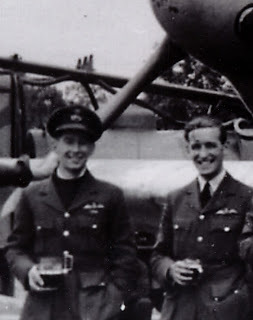
Excerpt 1:
"All I wanted was for her to smile at me," Banks defended himself. "Just one smile."
"Isn't my smile pretty enough for you?" The matron answered, her facing lighting up for him.
Banks appreciated the effort, but he felt shattered nevertheless. "I want to see a mirror."
"No, you don't," the matron countered. "It's too soon."
"It's my face. I have a right to see it."
"This isn't about your civic rights, young man. It's about what is best for your recovery."
"You think seeing my own face will have an negative impact on my recovery?"
"Yes, I do."
Banks thought about that. His face was so hideous that it made women sick just look at him, and his hands would never be strong enough for him to fly again. He had no future. Why on earth was he enduring all this pointless pain? "Can't you put me out of my misery?"
"A Stranger in the Mirror" opens with David "Banks" Goldman already in the Queen Victoria Cottage Hospital in East Grinstead, where the worst burn cases were treated by the soon-to-be legendary New Zealand plastic surgeon Dr. Archibald McIndoe. The obvious problem is that David has been severely burned after his Hurricane caught fire in a dogfight with an Me109. But David's identity crisis in only partly physical.
David was born in Germany and lived there for the first 13 years of his life. His family is Jewish and as the Nazis gain in popularity, David is subjected to ridicule and hostility, but he also has good friends who stand by him. Even as the family emigrates to Canada in late 1933, David's feelings toward Germany are confused. Seven years in Canada cannot change that. He hates the Nazis, but not Germany or all Germans. When he comes to the UK to join the RAF in 1940, it is to fight the Nazis who, he feels, are destroying his beloved country. Yet in England his identity is more confused than ever: he is a German Jew with a Canadian passport living among the British -- and not at all sure where he belongs.
David has another problem as well. His distant yet domineering father has long considered him a failure -- the son who didn't do well at school, the son who didn't get into college. David's passion for flying provokes only contempt from a father who views flying as a 'hobby' not a profession, and calls airline pilots 'glorified bus drivers.' But for David, flying has been his greatest passion, his joy, and his identity. And the doctor is telling him he may never fly again.
Excerpt 2:
"Fly? You can't mean you want to go back to being just a pilot?" His brother-in-law Clive exclaimed. "I would have thought you'd be beyond that 'fly boy' stage."
His father wouldn't have been able to say it better, Banks thought resentfully, and answered stubbornly. "No. Sorry to disappoint. I'm still in that 'stage,' as you put it. I very much hope to be passed fit for flying."
"But David!" [His sister] Sarah burst out. "Why? It could all happen again! Why risk it?"
"Because, in case you haven't noticed, we're still at war with Nazi Germany. Indeed, we're barely holding our own, and the RAF is the most important component in the fight."
"No question about that, old boy," Clive chimed in. "But I don't think anyone alive would question that you've already done your part. As Sarah said, why take more risks? There are lots of other ways to contribute to the war effort?"
"My ambition is to become an instructor at Training Command," Banks admitted.
"Well, that's a little better," Clive admitted, before adding, "and yet, there are a tremendous number of flying accidents. It would be a terrible tragedy if, having survived what the Luftwaffe did to you, you died because some student pilot made a stupid mistake. Why not consider something totally different?"
"Such as?"
Intelligence. With your language skills, you would be invaluable."
Banks made a non-committal reply and they left it at that.
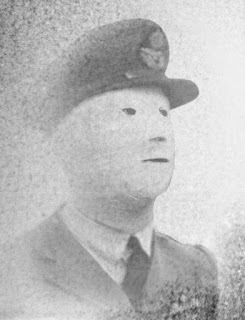 David "Banks" Goldman re-appears as an important character in "Bridge to Tomorrow" -- a series set against the backdrop of the Berlin Airlift.
David "Banks" Goldman re-appears as an important character in "Bridge to Tomorrow" -- a series set against the backdrop of the Berlin Airlift.
 Disfiguring injuries, class prejudice and PTSD are the focus of three tales set in WWII by award-winning novelist Helena P. Schrader. Find out more at: https://crossseaspress.com/grounded-eagles
Disfiguring injuries, class prejudice and PTSD are the focus of three tales set in WWII by award-winning novelist Helena P. Schrader. Find out more at: https://crossseaspress.com/grounded-eagles
they took the war to Hitler.
Their chances of survival were less than fifty percent.
Their average age was 21.
This is the story of just one bomber pilot, his crew and the woman he loved.
It is intended as a tribute to them all.
or Barnes and Noble.
 "This is the best book on the life of us fighter pilots in the Battle of Britain that I have ever seen.... I couldn't put it down."-- RAF Battle of Britain ace, Wing Commander Bob Doe.
"This is the best book on the life of us fighter pilots in the Battle of Britain that I have ever seen.... I couldn't put it down."-- RAF Battle of Britain ace, Wing Commander Bob Doe.
Winner of a Hemingway Award for 20th Century Wartime Fiction, a Maincrest Media Award for Military Fiction and Silver in the Global Book Awards.
Find out more at: https://crossseaspress.com/where-eagles-never-flew
For more information about all my books visit: https://www.helenapschrader.com
March 21, 2023
Characters of "Eagle" - Rosa Welkerling
During the Second World War, it was said that the Germans had a royal army, an imperial navy and a National Socialist (Nazi) air force. This largely captured the character of the leadership in the three armed forces, but in one way the Luftwaffe was not Nazi at all. Nazi ideology called for women to stay in the home not be active in the workforce much less the military. Yet the Luftwaffe pioneered with women auxiliaries and, like the WAAF to the RAF, these German women played an important role in the German air force from 1940 onwards. In "Where Eagles Never Flew," the leading German lady is a Luftwaffe auxiliary -- and so is her best friend
Rosa Welkerling
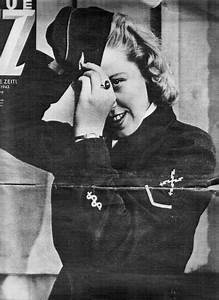
Excerpt:
Rosa and Klaudia said good night to the other girls and left their little mess, crossing the darkened games room and making for the main stairs. But as they reached the stairs sweeping up beside the reception area, they could hear music and singing coming from the Officer's Bar off to the left.
"Listen!" Rosa said with delight. "That's Veronica, der Lenz ist da! " When Klaudia looked blankly at her, she added, "You know! By the Comedian Harmonists!" Rosa might be a good National Socialist, but nothing could ruin her delight in the songs of the Berlin quintet. She tiptoed towards the stairs that led into the rustic bar with its flagstone floors and beamed ceiling half a floor below.
Someone was playing a piano very well, and several men were indeed singing in harmony. They could hear men clapping and stamping their feet in time to the music. Rosa tiptoed down four or five steps until, by bending, she could see into the bar itself. In a line with their arms around each other's shoulders, four of the pilots were dancing to the music as they sang.
Rosa Welkerling is a Berliner through-and-through. More specifically, she's the daughter of the industrial working class, fed on Marxism-Leninism from the cradle. But like many teenagers, she's rebellious and so rejects her parents Communism in favor of the exciting, new spirit of National Socialism.
It is her willingness to embrace the ideology of the ruling elite that helps the ambitious Rosa get ahead. She compensates for her educational deficiencies with enthusiasm and loyalty. In no time at all, she is promoted to leadership positions within the Bund Deutsche Maedel (the girls' equivalent of the Hitler Youth), in her troop at the Reichsarbeits Dienst (the compulsory national service organization in which all youth served for a year) and, eventually, in the Luftwaffe as an auxiliary.
All of which has no real impact on her practical character because Rosa is basically a cynical child of the urban slums who sees through the lies of the Nazis, too. While viewing the new ruling elite as no more admirable than the old ruling elite, Rosa is dispassionately taking advantage of the naivity of the Nazi leadership to pursue her own best interests. They look on her as a "useful idiot" blinding following their orders, while Rosa looks on them as idiots who don't see they are being manipulated by her pretense of fervor.
But Rosa, like many teenagers, over-estimates just how clever she is. She finds herself in a bind and rather than seeking help, tries to solve things in her own way -- with fatal consequences.
Excerpt Continued:
Klaudia hissed nervously from behind her. "Rosa! Come on! We don't want to get caught here!"
"Why not? Who says we can't watch?"
Klaudie nervously crept down and crouched beside her more daring friend ... [but] too soon the song came to an end. The pianist made a great flourishing finale, and the pilots went down on one knee -- or three of them did. The fat pilot got left standing, to the evident amusement of the clapping audience. Everyone was clapping. Someone was even calling "Encore! Encore!" Feldburg made a gesture of 'enough,' however, and the pilots headed toward the bar.
Rosa reluctantly got to her feet, sorry that the show was already over. "Axel was right," she concluded as the two girls went up to their room together. "It is a lot nicer here."

"This is the best book on the life of us fighter pilots in the Battle of Britain that I have ever seen.... I couldn't put it down."-- RAF Battle of Britain ace, Wing Commander Bob Doe.
Winner of a Hemingway Award for 20th Century Wartime Fiction, a Maincrest Media Award for Military Fiction and Silver in the Global Book Awards.
Find out more at: https://crossseaspress.com/where-eagles-never-flew
they took the war to Hitler.
Their chances of survival were less than fifty percent.
Their average age was 21.
This is the story of just one bomber pilot, his crew and the woman he loved.
It is intended as a tribute to them all.
or Barnes and Noble.
 Disfiguring injuries, class prejudice and PTSD are the focus of three heart-wrenching tales set in WWII by award-winning novelist Helena P. Schrader. Find out more at: https://crossseaspress.com/grounded-eagles
Disfiguring injuries, class prejudice and PTSD are the focus of three heart-wrenching tales set in WWII by award-winning novelist Helena P. Schrader. Find out more at: https://crossseaspress.com/grounded-eagles
For more information about all my books visit: https://www.helenapschrader.com
March 14, 2023
Characters of Eagles - The "Erks"
It was not the pilots alone who won the Battle of Britain. The finest pilots in the world are useless if their aircraft are not serviceable when needed. The RAF worked hard to ensure that its pilots were supported by some of the best trained ground crews in the world and when the test came in the summer of 1940, the men on the ground did not fail. RAF ground crews serviced and repaired British fighters -- often under adverse conditions, sometimes while under attack -- day after day from dawn to dusk until the battle had been won.
"Where Eagles Never Flew" gives several "erks" a voice -- the fitters Appleby, Sanders, and Tufnel, the riggers Ripley and Fowley, and the batman Thatcher -- are all individuals who make a contribution to the novel.
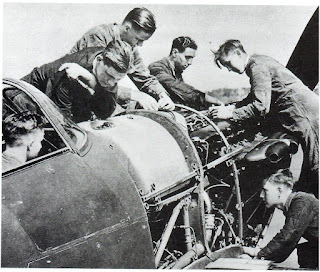
Excerpt 1:
Ripley was just about to climb into the cockpit when Priestman came up alongside. He stopped. "Good morning, sir."
"Morning. Tell me, do you know LAC Tufnel well?"
Ripley and Appleby exchanged a glance before Ripley answered cautiously. "Well enough, sir."
"Any idea why he would want to desert?"
"No, sir. Tufnel's a first-class man. One of Trenchard's brats," Ripley said firmly, his expression one of earnestness.
"Problems at home, maybe?" Priestman pressed him.
"No, sir... But he hasn't been himself since Sanders broke his back."
"Who?"
"Sanders, sir," Appleby took over from his taciturn colleague, coming nearer. "He and Tufnel were at Halton together and posted here together. Sanders had an accident before you took over the squadron. He fell backwards off a Hurricane wing and broke his back. He's up in Southampton in hospital now. I heard he won't ever walk again. You might want to talk to Fowley, sir. He's Sanders' replacement."
Throughout the inter-war years, the RAF had attracted technically minded young men with an ‘apprentice’ program that provided them with extensive training at a specially established technical college. Many of these young men from humble backgrounds latter learned to fly and became "Sergeant Pilots" -- the backbone of Fighter Command in the Battle of Britain. But those that remained in their jobs as mechanics, armorers and other technicians were valued and absolutely essential to success.
The erks in "Where Eagles Never Flew" are many and varied. Appleby is ambitious, cheeky and anxious to learn to fly. Ripley in steady, taciturn and thankful he isn't in the line of fire like the pilots are. Sanders is engaged to be married. Fowley's very young and straight out of training; he's conscious of having just scraped through his exams to get his qualifications -- and is now horrified to think that he might make a mistake that could cost a man his life.
Yet in the Battle of Britain the airfields were the front line. The Luftwaffe made a determined attempt to wipe out Fighter Command by targeting fighter stations. That meant that the erks weren't safe at all.
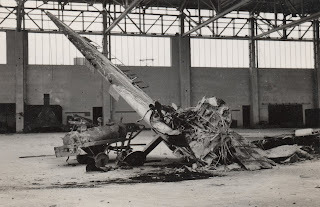
Excerpt 2:
The mess had taken what appeared to be several direct hits. Between craters, the rubble, dirt and debris were thrown up in heaps. Bits and pieces of clothing, furniture, cutler and masonry were scattered about as if a giant child had thrown a tantrum. Bizarrely, some things were whole while others were in pieces. A silver trophy recording someone's success at sports lay next to a toilet seat; a framed photograph had landed atop a heap of kitchenware. Water was gushing from a broken pipe and flooding the surrounding area. A lone shoe bobbed on the water as it spread.
When they reached the slit trench, they found that it had collapsed in on itself. That wasn't supposed to happen Appleby registered. Men with shovels were already at work, and the grey-clad legs of a WAAF were exposed -- all twisted around unnaturally. There were no shovels left, so Appleby went to work with a metal bucket. The earth wasn't packed hard -- just heavy with moisture, suffocating.
They dragged the first girl out, her hair trailing behind her, her face covered with dirt. Beneath it she was ghastly white and strangely peaceful. The next body was also a WAAF, a plump little thing, not particularly pretty, but Appleby remembered she'd worked in the kitchen and had a penetrating, high-pitched laugh that carried into the dining room. Now silenced forever, he thought swallowing, as he helped straighten out her limbs and pull her skirt down decently. One of the others took off his tunic to lay over her.
After that came almost a dozen airmen. Appleby knew them all. They worked as assistant cooks in the airman's mess and served out the meals. They were ordinary blokes. Many of them came from the same kind of background as he did -- but without the benefit of mothers who'd made them stay in school. Growing up in the slums of London, Liverpool or mining towns in the North, they were stunted and all but illiterate. At mustering, they were given the lowest skilled trades: cooks, orderlies, waiters and batmen.
Thatcher is just such a man. The product of the slums, he was undernourished as a child and he has bad teeth and bad eyes. He also dropped out of school too soon to apply for a Halton apprenticeship, and has done menial work all his life -- when he wasn't unemployed. Yet when the war comes, he doesn't wait to be called up. He has been fascinated by airplanes and now is his chance to get near them. He volunteers for the RAF. Because he not qualified for anything particular and doesn't do well on any of the aptitude tests, he is mustered for 'catering' duties, but rather than feeling insulted or demotivated, he sets out to do the absolute best he can -- and in so doing help win the war.
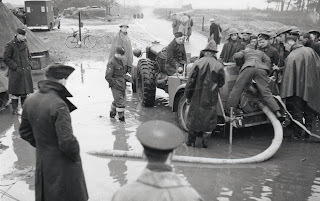
Excerpt 3:
When they weren't flying, they generally stretched out in the shade of their Hurricanes and tried to sleep. Priestman had done just that when an airman crawled under the wing beside him. He opened one eye, and honestly didn't recognize the ugly little man who was shaking his arm.
"You've got to eat something, sir," the AC1 urged.
Priestman sat up, forcing himself to focus. It was a cook from the mess. He was in his forties, with crooked yellow teeth, and he was thrusting a sandwich at him. "You 'aven't eaten all day, sir. You can't keep going on an empty stomach."
"How did you know I haven't eaten?" Priestman asked, taking the thick sandwich from the airman.
"Do you think I can't keep track of my pilots?" The AC1 asked indignantly. "You 'aven't been eating proper for two days, sir. It ain't good." The little airman was genuinely upset.

"This is the best book on the life of us fighter pilots in the Battle of Britain that I have ever seen.... I couldn't put it down."-- RAF Battle of Britain ace, Wing Commander Bob Doe.
Winner of a Hemingway Award for 20th Century Wartime Fiction, a Maincrest Media Award for Military Fiction and Silver in the Global Book Awards.
Find out more at: https://crossseaspress.com/where-eagles-never-flew
they took the war to Hitler.
Their chances of survival were less than fifty percent.
Their average age was 21.
This is the story of just one bomber pilot, his crew and the woman he loved.
It is intended as a tribute to them all.
or Barnes and Noble.
 Disfiguring injuries, class prejudice and PTSD are the focus of three heart-wrenching tales set in WWII by award-winning novelist Helena P. Schrader. Find out more at: https://crossseaspress.com/grounded-eagles
Disfiguring injuries, class prejudice and PTSD are the focus of three heart-wrenching tales set in WWII by award-winning novelist Helena P. Schrader. Find out more at: https://crossseaspress.com/grounded-eagles
For more information about all my books visit: https://www.helenapschrader.com
March 7, 2023
Characters from "Eagles" -- the "Adj"
The pilots and other aircrew tended to be arrogantly contemptuous of "penguins" and "wingless wonders" -- those nine-tenths of air force personnel doing various jobs that didn't entail flying. That contempt was not consistently distributed. Pilots generally had a high regard for their ground crews, who kept their aircraft serviceable, and other "technical trades," but "paper pushers generally enjoyed low regard.
And yet! No organization can, in fact, get along without them. We need people who order supplies, do the book-keeping and manage personnel files. Every RAF squadron had an adjutant -- because they needed one.
Today I introduce Ft./Lt. "Mickey" Michaels -- the Adjutant (2nd left)
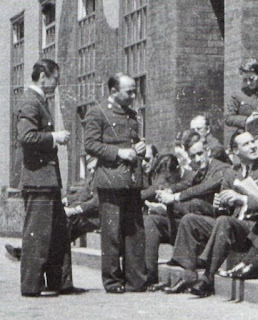
Excerpt:
The squadron leader had gone off, leaving the Adjutant struggling with the paperwork that was piling up. "I can't even hold him down long enough to sign off on the the things I've prepared for him. Poor LAC Sanders has been trying to get leave to get married, and --" Mickey realized he was complaining, and at once regretted it. It never looked good for an adjutant to complain about his CO. Distressed, Mickey was unconsciously wiping his balding head with his handkerchief.
By the look of things, Allars guessed that Mickey had moved all sorts of files into his own office from the adjoining squadron leader's office. Wooden boxes were lined up not only on his desk, but on two chairs which he had placed beside it. Everything was well ordered but overflowing.
Flight Lieutenant "Mickey" Michaels didn't choose to be a penguin. He joined the RAF with every hope of learning to fly -- he simply couldn't get the hang of it and "washed out" of flying training. He could have taken a "bowler hat" and sought his fortune in the civilian world, but his love of aircraft and flying made him want to stay as close to it as he could. So he had worked his way through various jobs that did not entail flying until, with the outbreak of the war, he found himself in the most exciting and demanding job of his fifteen year career: adjutant in a fighter squadron.
Mickey has no illusions about his place in the pecking order, and his job is not made easier by being posted to one of the Auxiliary Squadrons, one of those elite squadrons composed of young men who could afford to learn to fly at their own expense. No. 606 Squadron is one of the most snobbish of them all and in the interwar years had required applicants to have an independent income of at least GBP 1,000 a year -- a sum Mickey doesn't expect to earn annually any time in his life. But the amateurs are particularly disdainful of "paper work" and tend to look on Kings Regulations as suggestions rather than requirements. Mickey doesn't stand a chance of reforming their ways, all he can do is try to patch things up behind their backs.
When the fighting and dying starts, Mickey finds himself at the front line of trying to keep the replacements in aircraft, ground crew and pilots flowing. His loyalty to the squadron is not diminished by the fact that he is unappreciated. He accepts that is his lot, and then one day things change.
Excerpt 2:
They were down to 15 operational pilots and 12 aircraft at the moment. And still no flight lieutenants. Mickey had been nagging the Group Personnel people about flight lieutenants ever since Priestman chopped Thompson, but they weren't very sympathetic. The attitude was pretty much that no squadron leader in 11 Group was going to recommend promotion for a capable flying officer at a time like this, since they would thereby risk having him posted away. If they had anyone they could trust, they were guarding him jealously.
In short, Personnel implied, 606 would just have to make do with what it had. Ringwood seemed to be working out quite well, actually. As for new pilots, Peronnel complained that they "couldn't produce pilots out of thin air" -- always with an undertone of accusation, as if the front-line squadrons were careless with the pilots they did send. But there was no way they could keep up this pace with the pilots they had. Each engagement brought the risk of fresh casualties. Mickey thought they were bloody lucky not to have lost both Priestman and Kiwi two days ago. What the hell did Priestman think he was doing, firing at a loaded bomber from less than a hundred yards? You could almost think he was suicidal -- if you didn't know the bloke.
Mickey had warmed to Priestman. Yesterday he had come to the office with a bottle of champagne and insisted they celebrate his DFC together. Mickey had been touched beyond words. Most squadron leaders would have gone to a pub or celebrated in the Mess with their pilots, not even noticing that a paper-pushing ground-hog was not among them. Instead, Priestman dragged both Mickey and Allars out of their respective dens and made them join him for a bottle of bubbly.

"This is the best book on the life of us fighter pilots in the Battle of Britain that I have ever seen.... I couldn't put it down."-- RAF Battle of Britain ace, Wing Commander Bob Doe.
Winner of a Hemingway Award for 20th Century Wartime Fiction, a Maincrest Media Award for Military Fiction and Silver in the Global Book Awards.
Find out more at: https://crossseaspress.com/where-eagles-never-flew
they took the war to Hitler.
Their chances of survival were less than fifty percent.
Their average age was 21.
This is the story of just one bomber pilot, his crew and the woman he loved.
It is intended as a tribute to them all.
or Barnes and Noble.
 Disfiguring injuries, class prejudice and PTSD are the focus of three heart-wrenching tales set in WWII by award-winning novelist Helena P. Schrader. Find out more at: https://crossseaspress.com/grounded-eagles
Disfiguring injuries, class prejudice and PTSD are the focus of three heart-wrenching tales set in WWII by award-winning novelist Helena P. Schrader. Find out more at: https://crossseaspress.com/grounded-eagles
For more information about all my books visit: https://www.helenapschrader.com
February 28, 2023
Character from "Eagles" - The Spy
During the Battle of Britain, squadron intelligence officers (commonly referred to as "the spy") played a critical role in collecting and collating information. They spoke to pilots immediately after landing to hear what they had seen and heard and they reviewed combat reports. Their analysis was critical to assessing the Luftwaffe's strength, tactics, and morale. Today I introduce Squadron Leader Allars -- The Spy of 606 Squadron
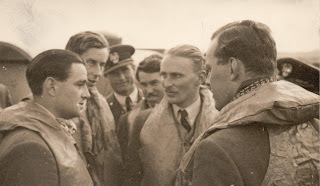
Excerpt:
It was quite late in the evening before Allars finally caught up with the CO in the Mess. By then, Allars was tired, annoyed and in pain. He had no patience for beating around the bush, and he got straight to the point. "I've looked into the combat reports from yesterday carefully, and I don't believe a word P/O Debsen told me. I don't believe he gave any warning -- at least, no one heard him. I don't believe he turned into the enemy -- or he would have encountered a little opposition and taken some damage to his aircraft. And I don't believe he chased and shot down an Me 110."
"What are you saying?" Jones asked, drawing his dark, bushy eyebrows together and narrowing his eyes.
"I'm saying that I think P/O Debsen not only falsified his combat report and made a false claim, but that he absented himself from the fight at the first sight of the enemy -- and before the bounce."
"But he fired his guns."
"He could have fired them into the sea. According to his erks, he fired less than a hundred rounds -- making it even more unlikely that he shot anything down."
Jones scowled, his thick eyebrows almost meeting over his nose. "I don't like what you're implying, Spy. Debsen's a gentleman, and I don't think it's fair to question a gentleman's word behind his back. Have you told him about your suspicions?"
"Not yet, but I will if you want me to."
"No, damn it!" Jones replied forcefully. "Leave the boy alone! He's young. We all make mistakes. I'm sure if he did something not quite above board, he regrets it now and won't do it again. He's a good lad, I tell you. Comes from a good stable."
"If that's the way you want to deal with it, sir," Allars replied tartly. His leg -- the one that wasn't there -- was killing him.
Squadron Leader Douglas Allars, the "Spy" for 606 Squadron, is a veteran of the First World War. He earned his wings in the Royal Flying Corps, where he flew as a fighter pilot in 48 Squadron under then Squadron Leader Keith Park. A crash left his leg hopelessly crushed and amputation had been necessary. He was invalided out of the service and took up a civilian career as an accountant.
As the Nazi threat grew, however, his old friend Keith Park (now an Air Vice Marshal) convinced him there was a place -- and more importantly a need -- for eagles with broken wings like him. He volunteered again and was trained in intelligence. His assignment is with 606 (Hurricane Squadron) stationed at Tangmere on the south coast of England.
Allars has a sharp analytical mind and he takes his job very seriously -- but without sentimentality. He's seen it all before. He knows the pilots are lambs for the slaughter. He keeps his distance from them. What he cares about is winning. And winning will be difficult.
Allars is acutely aware of what is at stake and he does not believe the RAF has margin for error. They have to be "top of their game" -- all of the time. Thus, despite being a man from a privileged background, Allars is anything but a snob. He has no tolerance for favoritism or excuses.
Allars will play a critical role in steering 606 Squadron out of potential disaster and molding it into an effective fighting unit -- but only from behind the scenes.

"This is the best book on the life of us fighter pilots in the Battle of Britain that I have ever seen.... I couldn't put it down."-- RAF Battle of Britain ace, Wing Commander Bob Doe.
Winner of a Hemingway Award for 20th Century Wartime Fiction, a Maincrest Media Award for Military Fiction and Silver in the Global Book Awards.
Find out more at: https://crossseaspress.com/where-eagles-never-flew
they took the war to Hitler.
Their chances of survival were less than fifty percent.
Their average age was 21.
This is the story of just one bomber pilot, his crew and the woman he loved.
It is intended as a tribute to them all.
or Barnes and Noble.
 Disfiguring injuries, class prejudice and PTSD are the focus of three heart-wrenching tales set in WWII by award-winning novelist Helena P. Schrader. Find out more at: https://crossseaspress.com/grounded-eagles
Disfiguring injuries, class prejudice and PTSD are the focus of three heart-wrenching tales set in WWII by award-winning novelist Helena P. Schrader. Find out more at: https://crossseaspress.com/grounded-eagles
For more information about all my books visit: https://www.helenapschrader.com

